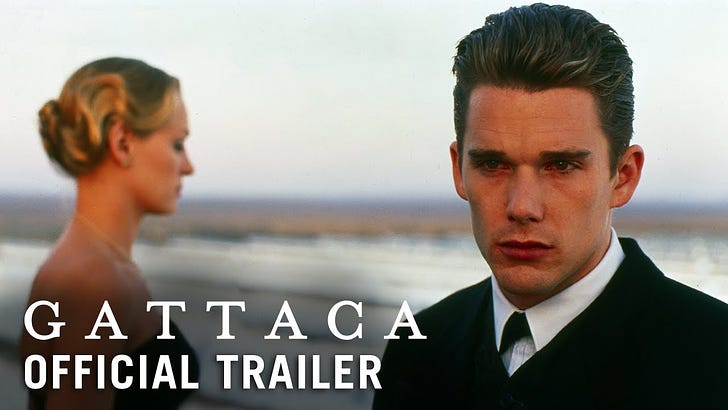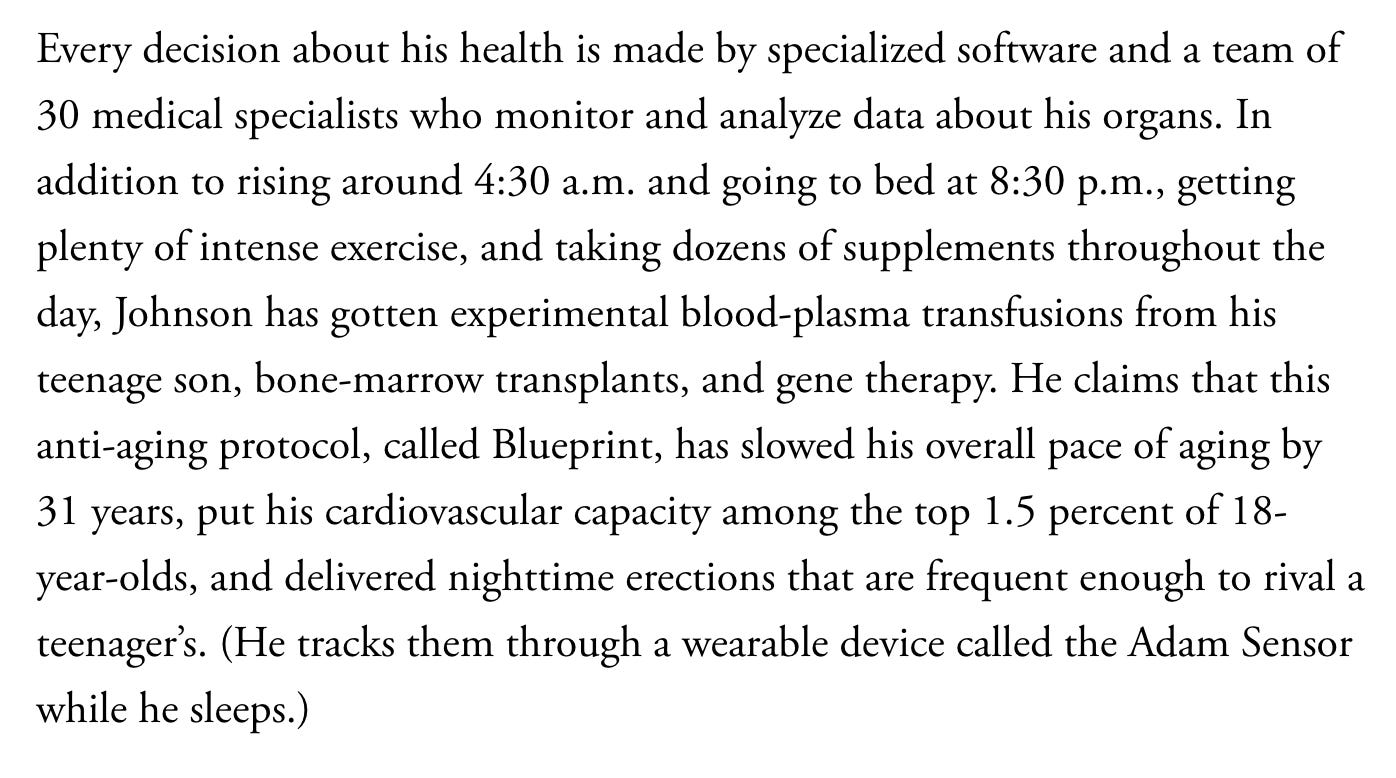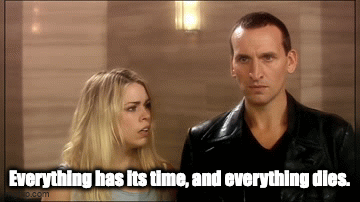There’s a lot about life in the news lately. What exactly IS life? Who (or what) has it? What does it mean if we give it to things that maybe aren’t really fully alive? And oh, hey, that AI thing isn’t going anywhere either, and when will we call that life? (Cue visions of the humanoid Cylons from the 2004 Battlestar Galactica series.)
The Atlantic recently ran a story about a 46-year-old guy named Bryan Johnson who has more money than anyone should, and also has delusions that he can somehow live forever. His attempt to prove this seems to involve some sort of “algorithm” that he follows slavishly, because he’s a tech bro, so of course he does.
Here’s how it’s described in the article:
I ask you: does this sound like fun to you? Does it sound like being alive? Does it sound, in fact, like anything other than a very weird full-time obsession?
It sure doesn’t sound like living to me. Among other things, I am left wondering just what his relationship with his teenage son is like—and I suspect that one day young Johnson will speak up about what it was like growing up with an obsessed father who not only extracts blood from his kid but also, we’re told, compares himself to Jesus and “jokes” about starting a cult.
Full disclosure: I went into this article fully expecting to be repulsed and annoyed by what I read, so I’m not exactly an unbiased reader. But really—who jokes about things like that while comparing himself to the founder of one of the world’s largest religions? These are not the behaviors of a normal human.
And just who do you have to be to convince yourself that living forever is a good idea in the first place? (I guess if you think you’re Jesus, the question answers itself.)
Just for a start, where the heck does he think everyone will live?? Now, I’m enough of a nerd to know there are other planets out there, but it’s 2024 and we haven’t done a thing about actually finding another one to live on. And just how many would we need? If we live forever and keep having kids, we’re gonna need a lot, and in a hurry.
There’s also a logical conundrum here, because we’re not done with the bizarre ideology just yet:
Okay, so what you’re saying is that we’ll not only be ruled by AI (oh, goodie!), the only answer to that is to just… stay alive forever? Why? How? To what end? What is the point of that life in a world where AI does everything? (And I don’t think, if you’ve been reading The Spark for a while, that I need to get into the idea of AI “generating knowledge.” You’ve all seen ChatGPT already.)
I have an answer to this, of course, if we assume the most benevolent version of this story, and that’s to create. If AI frees us up to do the one thing it cannot do, that humans excel at and generally long to do but can’t because of pressures from jobs and the economy, that’s a future I might be able to get behind, because I genuinely believe that it would yield a society that is more fundamentally alive than any we’ve seen before.
I don’t assume the most benevolent reading, though, because—again—I am a nerd, and I have read and seen things like the aforementioned Battlestar Galactica, and The Matrix, and countless others, and it’s pretty rare that the machines take over without enslaving humanity or otherwise creating a dystopian nightmare. Humans are also pretty good at enslaving ourselves to our own creations even without them making a conscious effort to force that role on us—if you don’t believe me, I invite you to contemplate your relationship with that mini-computer that lives in your pocket, or how we interact with work as a society, or even the way time, which is a human invention, too, dictates your life.
A couple years ago, I talked to a guy named Mark Ryall, who’d written a novel called Age-Decoded, which was all about how CRISPR technology could eliminate aging (I’m actually surprised CRISPR doesn’t come up in Johnson’s “algorithm,” though it could be part of the gene therapy they mention). It raises a host of ethical questions, and considering that editing the genone of our kids is one potential use, if you haven’t yet seen Gattaca, I suggest you do so at your earliest convenience.
And I’ve seen enough Doctor Who (and recent history) to know that humans are really, really, really good at finding reasons to create conflict and division among themselves even in the best of circumstances, which may be the biggest flaw we have as a species.
Could I be wrong? Sure. But as much as I hate to say it, I wouldn’t want to bet on it.
So Bryan Johnson pursues some sort of imagined glory of living forever in a dystopian world where humans are left with nothing to do but survive. Am I really the only one who thinks that sounds like a horrible, empty existence rather than something to strive for?
My last surviving great-grandmother, who lived to 95, told my mother not long before she died that “We live too long.” I’m not at all sure she was wrong. She died in 1985, but would she be any less wrong now? I’m not sure she would. I bet she’d have an earful for Bryan Johnson.
Fundamentally, for me, it comes down to this: Life should be lived. We already struggle with this idea because so much of Western culture, especially American culture, says we should live to work. “Life” is something for your “spare time” (how sad that the bit of life actually left to us is diminished as something “spare” rather than what we should be focused on!).
Too many of us aren’t really living our lives. We sell our time to others and then wonder where our lives have gone. Just looking at that list of things Bryan Johnson does, it’s clear that his version of living forever is not an equal-opportunity endeavor—not only does it not look like fun, your health insurance is not going to pay for your entirely elective blood transfusions from your kid/bone marrow transplants/gene therapy, not to mention a team of 30 medical folks—so people would have to work enough to be able to afford this “life” he’s advertising. There’s also plenty of research on the effect of stress on human health and longevity, like the new science of “weathering,” which is exacerbated by factors like poverty and racism, but boils down to the way your own natural stress response erodes your health over time.
It’s no surprise, then, that the guy who’s championing a science he can’t prove is a rich white guy who seems to have nothing better to do than spend money because he can. (Except obsess over whether he’s “dying” in the moment or not, according to the article, where he confesses, “I’m dying a little bit tonight” because he’s deviated from his self-imposed restrictions.)
And none of this even acknowledges how ageist the whole notion is, or how I’m sure Johnson “feels” younger than 46 because almost all of us feel younger than our actual age. So you can’t take his experience, sample size of one, to mean a single thing.
There’s really only one thing I know for sure:
Even if Johnson lives a little longer than the rest of us, will it have been worth all the rigamarole in the end? I really, really doubt it.
Am I wrong? Or does this whole thing creep you out, too? Let me know in a comment!








Ugh! Love your take on this, Nancy. I wasn't privy to his take on AI, which is as moronic as his health regimen. I'm very anti-Bryan Johnson and everything he represents. It's just maddening that he gets so much ink when there are much worthier people and causes to cover. Just another rich white dude making it all about himself, but pretending it's for the betterment of society. Most of all, I hate how agist his messaging is, as if getting older is a disease to avoid rather than a privilege. He may want to live forever, but he's already dead to me. :)
I definitely don't want to live forever.